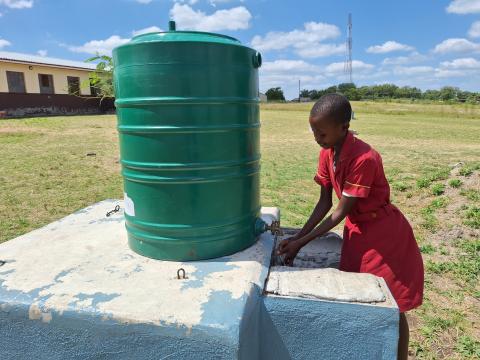Transforming Manzana Nazarene: A Tale of Overcoming Challenges and Cultivating Success in Education

A conducive learning environment is one of the most crucial factors in ensuring success for learners on their education journey. For a long time, Manzana Nazarene Primary School, located in Mliba in the Manzini Region, faced numerous challenges that created an environment not conducive to learning.
Among the school's problems was water scarcity and lack of proper toilets, resulting in frequent outbreaks of contagious illnesses caused by inadequate sanitation and hygiene.
"The situation was so dire that the Ministry of Health Inspectors shut down our toilets because they were a hazard to over 500 learners in the school," says the school's Head Teacher, Nozipho Magagula.
To add to the school's woes, they also had a shortage of classrooms, resulting in overcrowding of learners and difficulties in teaching. On average, the school had more than 50 learners in each class stream, necessitated by the lack of adequate classrooms at the school, whose initial construction was supported by the Manzana community with funding from the learners' parents and Microproject.
“Our teachers would even struggle to move around the classroom whilst teaching, making it difficult to teach effectively, which really affected us as a school,” says Magagula .
This situation was to change in 2019 when the Dong Tan Zion Methodist Church, through the World Vision Korea Support Office, donated SZL1 million (over USD52,800) towards the school's development. The funding, made available to World Vision Eswatini's Madlangempisi Area Programme, which ended operations in September 2023, saw the school receiving a new block of three classrooms, with electrification, fully furnished with a total of 135 desks and 135 chairs.
The school also received learning materials, including chalkboards and bulletin boards. To address the lack of access to safe water and proper sanitation, the school also received two 3,000-litre water tanks. Tackling the health hazard posed by inappropriate and dilapidated sanitation facilities, the construction of toilets with five boys' cubicles and five girls' cubicles was undertaken, as well as two teacher's toilets.
The school also received handwashing facilities, eight dustbins, and protective clothing during the pandemic. All these were implemented through World Vision Eswatini's technical programme interventions, which include Water, Sanitation and Hygiene (WASH); Health, Nutrition and HIV; as well as Child Protection and Sponsorship.
“World Vision has been of great help to the school and, for the first time ever, last year (2023) we obtained a 99% pass rate, from 74% in 2021 and 76% in 2022, something we attribute to the improved learning environment at our school," says Magagula, promising to ensure this positive change is sustained.
"Our old classrooms had cracked floors and our roofing would leak on rainy days. I am very happy about my new classroom because we can also have (science) experiments because they have electricity," says Philasande, a Grade 7 learner at the school.
Further encouraging the learners to maintain the improved performance, during a visit to the school on 13 February 2024, the Bishop of Dong Tan Zion Methodist Church, Ha Geun Su, pledged to sponsor a cultural learning visit to Korea for 10 of the school's learners who excel academically. They will be accompanied by two teachers from the school. The principal adds: "We are still amazed at the generosity of the pastor and his church and are truly grateful for this encouragement to our learners and teachers."